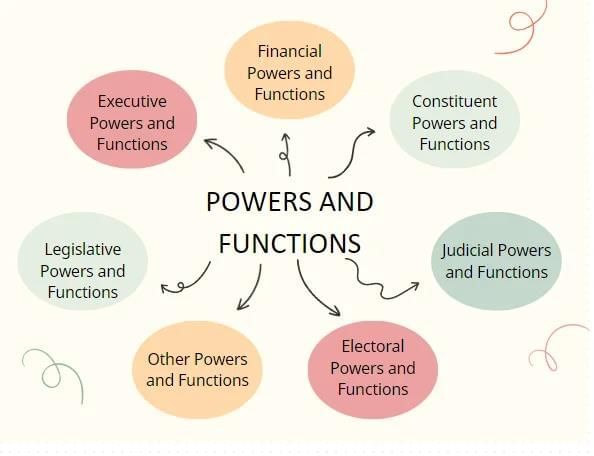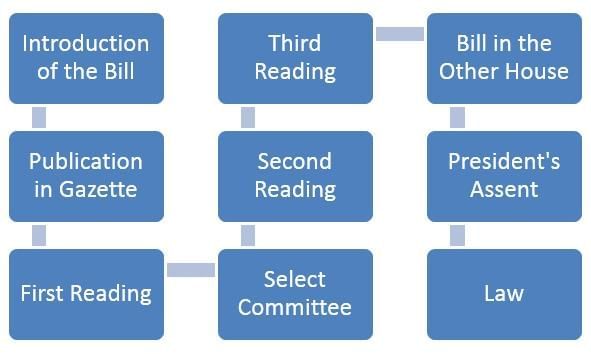NCERT Solutions for Class 11 Political Science - Legislature
Q1: Alok thinks that a country needs an efficient government that looks after the welfare of the people. So, if we simply elected our Prime Minister and Ministers and left to them the task of government, we would not need a legislature. Do you agree?
Give reasons for your answer.
Ans:  Branches of GovernmentAlok’s thinking is incorrect because simply electing the Prime Minister and ministers does not guarantee a representative democracy; it may lead to dictatorship.
Branches of GovernmentAlok’s thinking is incorrect because simply electing the Prime Minister and ministers does not guarantee a representative democracy; it may lead to dictatorship.
- Role of Legislature: The legislature's primary function is to frame laws, while the executive (Prime Minister and Ministers) is responsible for running the government.
- Accountability: The legislature ensures that the Council of Ministers is answerable to the people.
- Responsiveness: Without the legislature, the executive may become unresponsive to the hopes and aspirations of the people.
Q2: A class was debating the merits of a bicameral system. The following points were made during the discussion. Read the arguments and say if you agree or disagree with each of them, giving reasons.
(a) Neha said that a bicameral legislature does not serve any purpose.
Ans: Disagree.
- In a large and diverse country like India, two chambers are necessary to represent all sections of society adequately.
- They provide checks and balances, preventing misuse of power by any single chamber.
(b) Shama argued that experts should be nominated in the second chamber.
Ans: Agree.
- The President nominates 12 members to the Rajya Sabha who have distinguished themselves in literature, art, social service, and other fields.
- These members bring valuable experience and expertise, improving the quality of law-making.
(c) Tridib said that if a country is not a federation, then there is no need to have a second chamber.
Ans: Disagree.
- Even in non-federal countries, a second chamber ensures representation of different sections of society and acts as a revising and advisory body.
Q3: Why can the Lok Sabha control the executive more effectively than the Rajya Sabha can?
Ans:
- The government is formed by the party that secures the majority in the Lok Sabha, making it directly responsible to this house.
- Members of the Lok Sabha are directly elected by the people, ensuring executive accountability to citizens.
- The Lok Sabha can remove the executive through a no-confidence motion; the Rajya Sabha lacks this power.
- Financial control: Money bills can only be introduced in the Lok Sabha; the Rajya Sabha can only suggest amendments.
- Legislative dominance: Most crucial policies and laws require the Lok Sabha’s approval, giving it stronger control over the executive.
Q4: Rather than effective control of the executive, the Lok Sabha is a platform for the expression of popular sentiments and people's expectations. Do you agree? Give reasons.
Ans:
Yes, I agree that the Lok Sabha, beyond controlling the executive, is a platform for expressing popular sentiments and people's expectations.
Reasons:
- Members of the Lok Sabha voice their views on bills during discussions.
- They carry the sentiments and aspirations of their constituencies to Parliament.
- Debates on bills allow modifications or improvements, reflecting public concerns.
- Money Bills must be introduced in the Lok Sabha, giving it a key role in financial matters.
- Parliament, through the Lok Sabha, frames laws on subjects in the Union and Concurrent Lists, addressing issues important to the people.
Thus, the Lok Sabha serves as an effective mechanism for both controlling the executive and representing popular will.
Q5: The following are some proposals for making the Parliament more effective. State if you agree or disagree with each of them and give your reasons. Explain what the effect would be if these suggestions were accepted.
- Parliament should work for a longer period.
- Attendance should be made compulsory for members of Parliament.
- Speakers should be empowered to penalise members for interrupting the proceedings of the House.
Ans:
Parliament should work for a longer period – Agree
- Many important bills are delayed due to short sessions, boycotts, or opposition disruptions.
- Longer sessions ensure timely debates, discussions, and detailed scrutiny of legislation.
- Effect: Faster decision-making, better executive oversight, and reduced pendency of bills.
Attendance should be made compulsory for members – Agree
- Ensures members are present for debates and decisions, preventing quorum problems.
- Guarantees proper representation of constituencies.
- Effect: Greater accountability and more effective law-making.
Speakers should be empowered to penalise members for interrupting proceedings – Agree
- Reduces disturbances, maintains the dignity of the House, and prevents wastage of time.
- Ensures constructive debates while respecting dissenting members' rights.
- Effect: More productive sessions and better use of public funds.
Q6: Arif wanted to know that if ministers propose most of the important bills and if the majority party often gets the government bills passed, what is the role of the Parliament in the law-making process? What answer would you give him?
Ans: Though ministers propose most important bills and the majority party often gets them passed, Parliament plays a crucial role:
- Scrutiny and Debate: MPs thoroughly discuss and examine all bills in detail.
- Committee Review: Parliamentary committees analyse bills, suggest amendments, and recommend improvements.
- Opposition Role: Opposition MPs propose amendments to ensure diverse viewpoints are considered.
- Resolution of Disagreements: Joint sittings resolve disagreements between Lok Sabha and Rajya Sabha.
- Financial Oversight: Money Bills are introduced only in the Lok Sabha; the Rajya Sabha can delay them for 14 days at most, ensuring financial accountability.

Q7: Which of the following statements do you agree with the most? Give your reasons.
- Legislators must be free to join any party they want.
- Anti-defection law has contributed to the domination of the party leaders over the legislators.
- Defection is always for selfish purposes, and therefore, a legislator who wants to join another party must be disqualified from being a minister for the next two years.
Ans:
Freedom to join any party – Disagree
- Unlimited freedom may encourage corruption and political instability, especially during confidence motions.
- Some restrictions are necessary to honour the mandate given by voters.
Anti-defection law – Agree with its purpose
- Legislators can defect only under specific conditions, such as support from a minimum number of party members.
- This law prevents arbitrary defections and helps maintain political stability.
Defection is always selfish; disqualification for 2 years – Partially Agree
- Defection may not always be selfish, but to ensure fairness, a legislator joining another party should seek re-election before becoming eligible for ministerial posts.
- A 2-year restriction is reasonable to prevent misuse of power.
Q8: Dolly and Sudha are debating about the efficiency and effectiveness of the Parliament in recent times. Dolly believed that the decline of Indian Parliament is evident in the less time spent on debate and discussion and increase in the disturbances of the functioning of the House and walkouts etc. Sudha contends that the fall of different governments on the floor of Lok Sabha is a proof of its vibrancy. What other arguments can you provide to support or oppose the positions of Dolly and Sudha?
Ans:
Efficiency and effectiveness of Parliament
Supporting Dolly (decline of Parliament):
- Less time is spent on debates due to frequent disruptions and walkouts.
- Uproars and disturbances waste national time and resources, delaying important legislation.
- Reduced constructive discussions hinder effective law-making.
Supporting Sudha (Parliament’s vibrancy):
- Fall of governments shows that no government can take power for granted.
- Parliament ensures accountability through financial control and scrutiny of executive actions.
- Coalition governments remain answerable, preventing excessive concentration of power.
Other Suggestions:
- Party leaders should restrain members from creating disturbances.
- Presiding officers should take strict action against misconduct and encourage constructive participation.
Conclusion:
Despite challenges from disruptions, Parliament remains a key institution for accountability and law-making; discipline and constructive participation can enhance its effectiveness.
Q9: Arrange the different stages of passing of a bill into a law in their correct sequence:
(a) A resolution is passed to admit the bill for discussion
(b) The bill is referred to the President of India – write what happens next if s/he does not sign it.
(c) The bill is referred to the other House and is passed.
(d) The bill is passed in the house in which it was proposed.
(e) The bill is read clause by clause, and each is voted upon.
(f) The bill is referred to the subcommittee – the committee makes some changes and sends it back to the house for discussion.
(g) The concerned minister proposes the need for a bill.
(h) Legislative department in ministry of law, drafts a bill.
Ans:  Law-making Process(a) Proposal: The concerned minister proposes the need for a bill.
Law-making Process(a) Proposal: The concerned minister proposes the need for a bill.
(b) Admission:. The resolution is passed to admit the bill for discussion.
(c) Drafting: The legislative department in the Ministry of Law drafts the bill.
(d) Committee Review: The bill is referred to a subcommittee; the committee suggests changes and sends it back to the house.
(e) Clause-by-Clause Reading: Each clause of the bill is read and voted upon.
(f) Passing in House of Origin: The bill is passed in the house where it was proposed.
(g) Other House: The bill is referred to the other house and passed.
(h) Presidential Assent: The bill is sent to the President.
- If the President does not sign, the bill returns to Parliament for reconsideration.
- If passed again, the President must give assent.
- Note: There is no fixed time limit for reconsideration.
Conclusion:
This process ensures detailed scrutiny, debates, and consensus before a bill becomes law.
Q10: How has the system of parliamentary committees affected the oversight and appraisal of legislation by the Parliament?
Ans: The system of parliamentary committees has greatly enhanced Parliament’s ability to oversee and evaluate legislation. Key points include:
- Parliament meets for limited sessions, so committees undertake detailed scrutiny of bills and other matters.
- There are various committees, such as Standing Committees, Joint Committees, Business Advisory Committee, Estimates Committee, and Public Accounts Committee.
- Committees gather information, summon experts, and study issues in depth before reporting to Parliament.
- Parliament debates committee reports and usually approves their recommendations; rejecting them is rare.
- Effect: Committees reduce Parliament’s workload, ensure thorough examination, improve legislative quality, and support informed decision-making.
|
151 videos|780 docs|202 tests
|
FAQs on NCERT Solutions for Class 11 Political Science - Legislature
| 1. What is the role of the legislature in a democracy? |  |
| 2. How is the legislature structured in India? |  |
| 3. What are the main functions of the Indian Parliament? |  |
| 4. How can citizens participate in the legislative process? |  |
| 5. What is the difference between a bill and an act in the legislative context? |  |

















